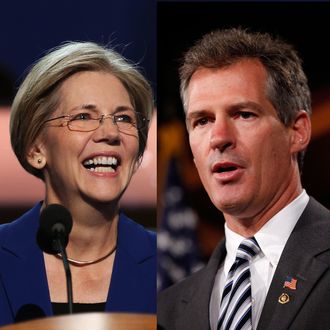
For most of the first debate in the Massachusetts Senate race, the Republican party was the elephant in the room. Brown continued his strategy of distancing himself from the rest of his party by repeatedly citing a 2011 Congressional Quarterly study that named him the second most bipartisan senator and aligning his views with those of the late Senator Ted Kennedy. However, while many expected that Mitt Romney’s “47 percent” remark, which Brown has already criticized, would become an issue in the debate, the presidential candidate was barely mentioned. Instead, for most of the hour Elizabeth Warren picked at Brown’s voting record, suggesting that while he holds some moderate views, the state’s left-leaning voters can’t trust him to be on their side 100 percent of the time.
The debate immediately got personal, with Brown attacking Warren on her controversial claims about her Native American heritage. (She is one thirty-second Cherokee.) Brown called on her to release her personnel records from Harvard University and the University of Pennsylvania to determine if claiming minority status gave her a professional advantage. “She checked the box claiming she’s a Native American and clearly she’s not,” said Brown. Warren said that while growing up she didn’t question the stories her family told her about their roots, and people she’s worked with have said her minority status played no part in the decision to hire her. “This is my family, this is who I am, and it’s not going to change,” said Warren.
Warren didn’t seem very rattled by the attack, and quickly moved on to discussing Brown’s record in the Senate. She noted that he had voted against three jobs bills in a row, but he countered that the proposals were too costly and it was a “bipartisan rejection.” Warren said he’d voted for subsidies for Big Oil, and he responded that he’s focused on prices at the pump and ending our dependence on foreign oil. (His famous vehicle made a cameo, with Brown noting that it “took about $70 to fill up the truck the other day.”) They also faced off on his vote against confirming Elena Kagan, former Dean of Harvard Law, for the Supreme Court. Warren said she was surprised that someone who’s in favor of abortion rights would pass up the opportunity to put a pro-choice woman on the bench. Brown said he believed she didn’t have enough courtroom experience, adding, “I’m sorry I didn’t vote for your boss.” After Warren listed a number of votes that she said were anti-women, Brown replied, “You should stop trying to scare women. I have been fighting for women since I was six years old,” going on to describe defending his mother against abusive stepfathers.
In the final question of the debate, Warren seized an opportunity to spell out to voters that while they may see Brown as a likeable moderate, voting for a Republican could have bigger implications. While Brown said that he “absolutely” believes climate change is real and “a combination between man-made and natural,” Warren noted that if Republicans take control of the Senate, Jim Inhofe will become the chairman of the committee that oversees the EPA. “He’s a man who has called global warming a hoax. In fact, that’s the title of his book,” she said. Brown shot back, “You’re not running against Jim Inhofe, you’re running against me.” However, since Massachusetts is one of a handful of states that the GOP is focusing on in its effort to retake the Senate, that may not be entirely accurate. “It’s not just about Senator Brown’s vote,” said Warren. “This is about the votes of all of the Republicans.”






























